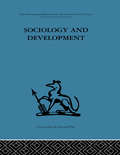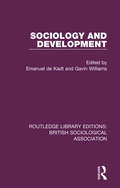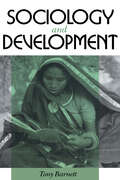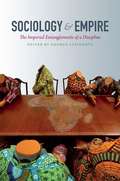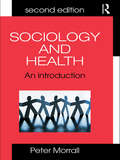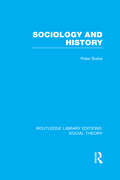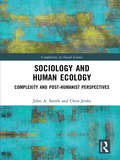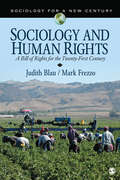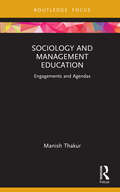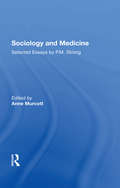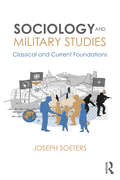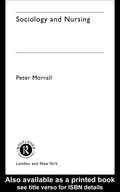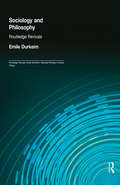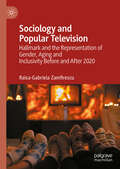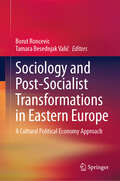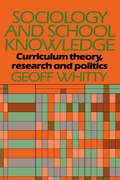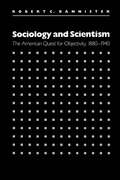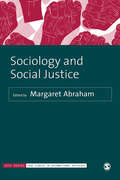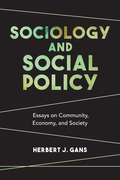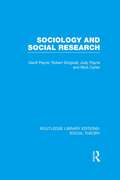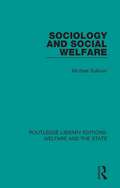- Table View
- List View
Sociology and Architectural Design (Social Science Frontiers)
by John ZeiselThis book, encouraging more effective collaboration between professional architects and social scientists, outlines how social science research can aid the design process, detailing how physical environment relates to behavior. With a foreword by Hugh F. Cline.
Sociology and Development (Routledge Library Editions: British Sociological Association Ser. #8)
by Emanuel De Kadt Gavin WilliamsTavistock Press was established as a co-operative venture between the Tavistock Institute and Routledge & Kegan Paul (RKP) in the 1950s to produce a series of major contributions across the social sciences. This volume is part of a 2001 reissue of a selection of those important works which have since gone out of print, or are difficult to locate. Published by Routledge, 112 volumes in total are being brought together under the name The International Behavioural and Social Sciences Library: Classics from the Tavistock Press. Reproduced here in facsimile, this volume was originally published in 1974 and is available individually. The collection is also available in a number of themed mini-sets of between 5 and 13 volumes, or as a complete collection.
Sociology and Development (Routledge Library Editions: British Sociological Association)
by Emanuel de Kadt Gavin WilliamsOriginally published in 1974 Sociology and Development are a selection papers from the British Sociological Association’s conference on development. The book combines both theoretical discussion and empirical material drawn from both urban and rural areas in Africa, Latin America, China, the USSR and Great Britain, as well as from specific studies on the mass media and the health services. Above all, the papers contribute to a greater understanding of reality in dependent, less developed societies, and so modify some of the over-simplifications introduced by the sweeping vision of the new theorists.
Sociology and Development: Economy And Society In Latin America And Africa (Routledge Library Editions: Development Ser.)
by Tony BarnettFirst Published in 1988. Routledge is an imprint of Taylor & Francis, an informa company.
Sociology and Empire: The Imperial Entanglements of a Discipline
by George SteinmetzThe revelation that the U. S. Department of Defense had hired anthropologists for its Human Terrain System project--assisting its operations in Afghanistan and Iraq--caused an uproar that has obscured the participation of sociologists in similar Pentagon-funded projects. As the contributors to Sociology and Empire show, such affiliations are not new. Sociologists have been active as advisers, theorists, and analysts of Western imperialism for more than a century. The collection has a threefold agenda: to trace an intellectual history of sociology as it pertains to empire; to offer empirical studies based around colonies and empires, both past and present; and to provide a theoretical basis for future sociological analyses that may take empire more fully into account. In the 1940s, the British Colonial Office began employing sociologists in its African colonies. In Nazi Germany, sociologists played a leading role in organizing the occupation of Eastern Europe. In the United States, sociology contributed to modernization theory, which served as an informal blueprint for the postwar American empire. This comprehensive anthology critiques sociology's disciplinary engagement with colonialism in varied settings while also highlighting the lasting contributions that sociologists have made to the theory and history of imperialism. Contributors. Albert Bergesen, Ou-Byung Chae, Andy Clarno, Raewyn Connell, Ilya Gerasimov, Julian Go, Daniel Goh, Chandan Gowda, Krishan Kumar, Fuyuki Kurasawa, Michael Mann, Marina Mogilner, Besnik Pula, Anne Raffin, Emmanuelle Saada, Marco Santoro, Kim Scheppele, George Steinmetz, Alexander Semyonov, Andrew Zimmerman
Sociology and Health: An Introduction
by Peter MorrallThis lively, introductory text provides students and health practitioners with the foundations of a sociological understanding of health issues. Written for anyone who is interested in health and disease in contemporary global society, this book engages the reader to act upon their occupational and moral responsibilities. It explains the key sociological theories and debates with humour and imagination in a way that will encourage an inquisitive and reflective approach on the part of any student who engages with the text. With individual chapters covering sociology, health, science, power, medicalisation, madness happiness, sex, violence and death, Sociology and Health is organized so that the student moves through sociological approaches and themes which constantly recur in the experience of healthcare. Students will find this a readable and controversial text which covers the ground they need to know in a thought-provoking way. Lecturers will find it a helpful text for generating discussion in tutorials and seminars. There are summaries at the end of each chapter, suggestions for further reading and ideas for the reader.
Sociology and History (Routledge Library Editions: Social Theory Ser.)
by Peter BurkeSociologists and historians are not always the best of neighbours, each group tending to perceive the other in terms of the crudest of stereotypes. However, the two approaches are obviously complementary – change is structured, and structures change. Each discipline can free the other from its own kind of parochialism and the aim of this book is to bridge the gap between these tow subcultures, to give historians a more acute sense of structure and sociologists a more acute sense of change.
Sociology and Human Ecology: Complexity and Post-Humanist Perspectives (Complexity in Social Science)
by Chris Jenks John A SmithTraditionally, Sociology has identified its subject matter as a distinct set – social phenomena – that can be taken as quite different and largely disconnected from potentially relevant disciplines such as Psychology, Economics or Planetary Ecology. Within Sociology and Human Ecology, Smith and Jenks argue that this position is no longer sustainable. Indeed, exhorting the reader to confront human ecology and its relation to the physical and biological environments, Smith and Jenks suggest that the development of understanding with regards to the position occupied by the social requires, in turn, an extension of the component disciplines and methodologies of a ‘new’ human socio-ecology. Aiming to evoke critical change to the possibility, status and range of the social sciences whilst also offering essential grounding for inter-disciplinary engagement, Sociology and Human Ecology will appeal to postgraduate students and postdoctoral researchers interested in fields such as Social Theory, Socio-Biology and Ecological Economics.
Sociology and Human Rights: A Bill of Rights for the Twenty-First Century
by Judith Blau Mark FrezzoEdited by renowned scholars, Judith Blau and Mark Frezzo, this groundbreaking anthology examines the implications that human rights have for the social sciences. The book provides readers with a wide-ranging collection of articles, each written by experts in their fields who argue for an expansion of fundamental human rights in the United States. To provide an international context, the Sociology and Human Rights covers the human rights treaties that have been incorporated into the constitutions of many countries throughout the world, including wealthy nations such as Spain and Sweden and impoverished countries such as Bolivia and Croatia.
Sociology and Management Education: Engagements and Agendas (Routledge Focus on Management and Society)
by Manish ThakurWhile examining the intersections and engagements between sociology and management education in historical and contemporary terms, this slim volume outlines the agenda of a promising prospective engagement between the two. It specifically foregrounds the Indian experience without being indifferent to the global context that has shaped the unprecedented rise of business schools. Employing a perspective from the Global South, it contextualises the dominance of the US model of management curriculum and disciplinary practices in relation to wider geopolitics of knowledge production. Parenthetically, it presents a critical assessment of Indian scholarly contributions to the field of management studies. This book should be of interest to management educators, administrators, and sociologists besides the students and researchers in the broad area of organisation studies.
Sociology and Medicine: Selected Essays by P.M. Strong (Ashgate Classics In Sociology Ser.)
by Anne MurcottDoctors and patients, inter-professional rivalries, how sociologists might tackle the study of vital topics in health - all these are enduring themes in sociology and medicine. These are also the long-running intellectual preoccupations of Philip M. Strong's twenty-year contribution to the field - one which he did much to shape. Posthumously gathered together for the first time in this volume, are twelve of his major essays, many of which are difficult to find or have been out of print for some years. Grouped by theme, this important reference allows the reader to trace the development of Strong's thought over his career as well as the more general development of medical sociology as a whole.
Sociology and Military Studies: Classical and Current Foundations (Cass Military Studies)
by Joseph SoetersThis book examines the connection between sociology and the challenges faced by the modern military. Military sociology has received little attention in the broader academic world, and is mostly focused on civil-military relations. This book seeks to address this gap and combines ideas, theories and insights from sociology’s founding authors, with each chapter focusing on a specific thinker. There are chapters on Max Weber, Emile Durkheim, Karl Marx, Georg Simmel, Jane Addams, W. E. B. Du Bois, Erving Goffman, Michel Foucault, Morris Janowitz, Norbert Elias, Cornelis Lammers, Arlie Russell Hochschild, Cynthia Enloe and Bruno Latour, and each essay discusses their ideas and theories in relation to topics that are of concern in and around the military today. Military studies are taken in a broad sense here, so the volume encompasses a wide range of issues, including civil-military relations, military-political affairs, performance and outcomes of military operations, and organizational arrangements including technology and the composition, performance and well-being of personnel. The book intends to provide views and insights that will help the military to innovate their organizations and practices, not necessarily in the usual functional way of innovating (i.e. faster, more precise, etc.) but in a broader way. This book will be of great interest to students of sociology, military studies, civil-military relations, war and conflict studies, and IR in general.
Sociology and Nursing: An Introduction (Routledge Essentials For Nurses Ser.)
by Peter MorrallThis introductory text provides nurses with the foundations of a sociological understanding of health issues which they should find of great help in thinking about their work and the role of their profession. It explains the key sociological theories and debates with humour and imagination in a way which will encourage an inquisitive and reflective approach on the part of any student who engages with the text.
Sociology and Philosophy (Routledge Revivals: Emile Durkheim: Selected Writings in Social Theory)
by Emile DurkheimFirst published in English in 1953, this volume represents a collection of three essays written by seminal sociologist and philsopher Emile Durkheim in which he puts forward the thesis that society is both a dynamic system and the seat of moral life. Each essay stands alone, but their connecting thread is the dialectic demonstration that a phenomenon, be a sociological or psychological one, is relatively independent of its matrix. The essays provide a valuable insight into Durkeheimian thought on sociological and philsophical matters and offer an excellent guide to Durkheim for students of both disciplines.
Sociology and Popular Television: Hallmark and the Representation of Gender, Aging and Inclusivity Before and After 2020
by Raisa-Gabriela ZamfirescuThis book examines representations of gender, age and identity across the Hallmark film and television output in relation to specific periods of time that pertain to changes within the specific entertainment sector. Using a comprehensive collection of 628 original Hallmark television films released between January 2015 and December 2023, the book applies content analysis to a variety of quantitative, qualitative, and mixed data, including behind-the-scenes credits, actors and actresses, characters and their narratives, promotional posters, Facebook comments, and official synopsis. In addition to examining diversity of race and religion, it analyses ageism through the portrayal of elders and young people in idealized imagery and stereotypes, inclusivity of LGBTQ and disabled characters, and ageism in relation to both masculinities and femininities. This book will be of interest to readers in fields including gender studies and sociology, visual communication, film and television studies, aging, media and communications, and popular culture.
Sociology and Post-Socialist Transformations in Eastern Europe: A Cultural Political Economy Approach
by Borut Roncevic Tamara Besednjak ValičThe volume offers a unique and comprehensive reflection on the role of sociology and sociologists in the transformation of post-socialist Eastern European societies. It provides detailed insight on the status of sociology in Eastern Europe, its institutional development, specifics of national sociological traditions, the controversial and ambiguous relationship with the political system and, importantly, state-of-the-art knowledge about the role of sociology as a discipline and sociologists as academics, educators, public intellectuals, experts, politicians, or civil society activists in three decades of transformation. The volume follows a cultural political economy approach and provides a series of national case studies that analyse the role of sociology in re-imagining Eastern European societies. This topical volume is of interest to a wide, interdisciplinary readership in the social sciences, especially students and researchers working on Eastern Europe and on post-socialist societies.
Sociology and School Knowledge: Curriculum Theory, Research And Politics (Routledge Library Editions: Sociology Of Education Ser. #59)
by Geoff WhittyThe rise of a radical 'new' sociology of education during the early 1970s focused attention on the nature of school knowledge. Although this new approach was set to revolutionize the subject, within a few years, many people considered these developments an eccentric interlude, with little relevance to curriculum theory or practice. First published in 1985, this book offers a more positive view of the new sociology of education and its contribution to our understanding of the curriculum. In doing so, it argues that some of the radical promise of the new sociology of education could be realised, but only if sociologists, teachers and political movements of the left work more closely together
Sociology and School Knowledge: Curriculum Theory, Research and Politics (Routledge Library Editions: Sociology of Education #59)
by Geoff WhittyThe rise of a radical ‘new’ sociology of education during the early 1970s focused attention on the nature of school knowledge. Although this new approach was set to revolutionize the subject, within a few years, many people considered these developments an eccentric interlude, with little relevance to curriculum theory or practice. First published in 1985, this book offers a more positive view of the new sociology of education and its contribution to our understanding of the curriculum. In doing so, it argues that some of the radical promise of the new sociology of education could be realised, but only if sociologists, teachers and political movements of the left work more closely together.
Sociology and Scientism
by Robert C. BannisterDuring the 1920s a new generation of American sociologists tried to make their discipline more objective by adopting the methodology of the natural sciences. Robert Bannister provides the first comprehensive account of the emergence of this "objectivism" within the matrix of the evolutionism of Lester Ward and other founders of American sociology.Objectivism meant confining inquiry to the observable externals of social behavior and quantifying the results. Although objectivism was a marked departure from the theoretical and reformist sociology of the prewar years, and caused often-fierce intergenerational struggle, sociological objectivism had roots deep in prewar sociology.Objectivism first surfaced in the work of sociology's "second generation," the most prominent members of which completed their graduate work prior to World War I. It gradually took shape in what may be termed "realist" and "nominalist" variants, the first represented by Luther Lee Bernard and the second by William F. Ogburn and F. Stuart Chapin. For Bernard, a scientific sociology was radical, prescribing absolute standards for social policy. For Ogburn and Chapin, it was essentially statistical and advisory in the sense that experts would concern themselves exclusively with means rather than ends.Although the objectivists differed among themselves, they together precipitated battles within the American Sociological Society during the 1930s that challenged the monopoly of the Chicago School, paving the way for the informal alliance of Parsonian theorists and a new generation of quantifiers that dominated the profession throughout the 1950s. By shedding new light on the careers of Ward and the other founders and by providing original accounts of the careers of the leading objectivists, Bannister presents a unique look at the course of sociology before and after World War I. He puts theory formation in an institutional, ideological, and biographical setting, and thus offers an unparalleled look at the formation of a modern academic profession.
Sociology and Social Justice: Toward A More Just World (SAGE Studies in International Sociology)
by Margaret Abraham"Superbly conceptualises and contextualises social justice in and for our global age. The stellar cast of sociologists connect concepts to practices and outline the challenges we face, as well as providing necessary responses." Gurminder K Bhambra, Professor of Postcolonial and Decolonial Studies, University of Sussex" A collection of brilliant essays by international scholar-activists, examining concepts and practices from diverse contexts." Mary Romero, Professor of Justice Studies and Social Inquiry, Arizona State University "An excellent set of chapters bringing to the fore new perspectives on the social injustices and inequalities facing a world in crisis." Kammila Naidoo, Professor of Sociology, University of Johannesburg By using contextual global sociology, Sociology and Social Justice explores: Historic and contemporary sites and contexts around the world Sociological insights on topics ranging from social movements, to cyber space. International struggles, processes, and outcomes Written by distinguished international scholars, this is an essential text for those looking at issues of: Human Rights, Public Sociology, Democratization, Gender, and Globalization.
Sociology and Social Justice: Toward A More Just World (SAGE Studies in International Sociology)
by Margaret Abraham"Superbly conceptualises and contextualises social justice in and for our global age. The stellar cast of sociologists connect concepts to practices and outline the challenges we face, as well as providing necessary responses." Gurminder K Bhambra, Professor of Postcolonial and Decolonial Studies, University of Sussex" A collection of brilliant essays by international scholar-activists, examining concepts and practices from diverse contexts." Mary Romero, Professor of Justice Studies and Social Inquiry, Arizona State University "An excellent set of chapters bringing to the fore new perspectives on the social injustices and inequalities facing a world in crisis." Kammila Naidoo, Professor of Sociology, University of Johannesburg By using contextual global sociology, Sociology and Social Justice explores: Historic and contemporary sites and contexts around the world Sociological insights on topics ranging from social movements, to cyber space. International struggles, processes, and outcomes Written by distinguished international scholars, this is an essential text for those looking at issues of: Human Rights, Public Sociology, Democratization, Gender, and Globalization.
Sociology and Social Policy: Essays on Community, Economy, and Society
by Herbert J. GansThis collection of recent essays by the influential sociologist Herbert J. Gans brings together the many themes of Gans’s wide-ranging career to make the case for a policy-oriented vision for sociology. Sociology and Social Policy explicates and helps solve social problems by presenting a range of studies on what people, institutions, and social structures do with, for, and against one another. These works from across Gans’s areas of interest—the city, poverty, ethnicity, employment and political economy, and the relationship between race and class—together make a powerful call to action for the field of sociology.
Sociology and Social Research (Routledge Library Editions: Social Theory)
by Robert Dingwall Geoff Payne Judy Payne Mick CarterA social science which has become so remote from the society which pays for its upkeep is ultimately doomed, threatened less by repression than by intellectual contempt and financial neglect. This is the message of the authors of this book in this reassessment of the evolution and present state of British sociology. Their investigation analyses the discipline as a social institution, whose product is inexorably shaped by the everyday circumstances of its producers; it is the concrete outcome of people’s work, rather than a body of abstract ideas. Drawing upon their varied experience as teachers and researchers, they identify three major trends in contemporary sociology. First, that the discipline’s rapid expansion has led to a retreat from rigorous research into Utopian and introspective theorising. Second, that the concept of sociological research is being taught in a totally false way because of this, and encourages ‘research’ within a wholly academic environment. Third, that the current unpopularity of sociology with academics, prospective students and politicians is no coincidence, but a reflection of the conditions under which sociology is now produced and practised. In Sociology and Social Research the authors suggest substantial changes in sociological research, the way in which it is carried out and the conditions under which it is undertaken. Their book is a timely warning to fellow sociologists when the profession is under attack as a result of public expenditure cuts.
Sociology and Social Welfare (Routledge Library Editions: Welfare and the State #19)
by Michael SullivanOriginally published in 1987, Sociology and Social Welfare looks at the relationship between state and welfare in the context of a wider sociological analysis of state and society in post-war Britain. The book looks at two main concerns, the first suggests the ways in which the theory and practice of welfare might be made more reflective and self-conscious if located in sociological understandings of state, society, and welfare. The second suggests that the sociological study of social work and other welfare activities might lead to the development of a more sensitive and practice-informed sociology.
Sociology and Socialism in Contemporary China
by Siu-lun WongFirst published in 1979. Sociology flourished in China during the 1930s and 1940s but with the establishment of the People's Republic of China, controversies arose over the place of sociology in the process of socialist construction. Siu-lun Wong analyses the reasons for this change in the fortune of sociological studies in China and examines it in relation to the country's contemporary political system.

